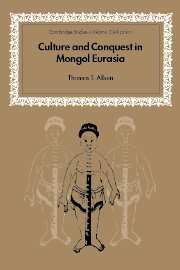Book contents
- Frontmatter
- Contents
- Preface
- Note on transliteration
- Abbreviations
- PART I BACKGROUND
- PART II POLITICAL–ECONOMIC RELATIONS
- PART III INTERMEDIARIES
- 9 Marco Polo and Po-lo
- 10 Qubilai and Bolad Aqa
- 11 Rashīd al-Dīn and Pūlād chīnksānk
- PART IV CULTURAL EXCHANGE
- PART V ANALYSIS AND CONCLUSIONS
- Bibliography
- Index
- Other titles in the series
11 - Rashīd al-Dīn and Pūlād chīnksānk
Published online by Cambridge University Press: 04 September 2009
- Frontmatter
- Contents
- Preface
- Note on transliteration
- Abbreviations
- PART I BACKGROUND
- PART II POLITICAL–ECONOMIC RELATIONS
- PART III INTERMEDIARIES
- 9 Marco Polo and Po-lo
- 10 Qubilai and Bolad Aqa
- 11 Rashīd al-Dīn and Pūlād chīnksānk
- PART IV CULTURAL EXCHANGE
- PART V ANALYSIS AND CONCLUSIONS
- Bibliography
- Index
- Other titles in the series
Summary
The decision to send Bolad on an embassy to Arghun (A-lu-hun) is most fully reported in the Chinese biographies of his traveling companion, ʿIsā (Aihsieh). According to these sources, ʿIsā was selected to accompany Ch'enghsiang Po-lo as an aide (chiai) because of his previous experience as an “envoy to distant parts.” Though left unsaid, it is obvious that as a native of the West he could function there as an interpreter.
As we have already seen, Bolad and ʿIsā arrived in Iran in late 1285 after a perilous overland journey and there conferred Qubilai's blessings on Arghun's second elevation. In early 1286 the two envoys then began their long journey home. Their respective fates are noted by Ch'eng Chü-fu, ʿIsā's biographer:
Because they encountered the rebellion [of Qaidu and Du'a] on their return trip the envoy [Bolad] and the aide [ʿIsā] were separated from one another. [ʿIsā], braving slings and arrows, emerged from this land of death and two years [later] finally reached the capital [Ta-tu]. He presented the precious garment and belt offered by Prince Arghun [A-lu-hun] and was ordered to make a full report of his observations on the outward and return journeys.The emperor [Qubilai], greatly pleased, turned to his court officials and said with a sigh: “Bolad was born in our land, enjoyed our emoluments and yet is content to stay there; ʿIsā, was born there, has his [original] home there and yet is faithful to me. How different they are!”
- Type
- Chapter
- Information
- Culture and Conquest in Mongol Eurasia , pp. 72 - 80Publisher: Cambridge University PressPrint publication year: 2001



